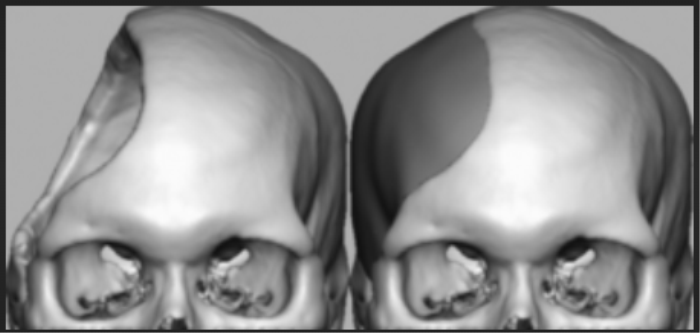Cranioplasty surgery is a crucial procedure performed to restore the integrity of the skull, often required after traumatic brain injuries, skull fractures, or previous brain surgeries that leave defects in the cranial bone. In India, the need for cranioplasty is rising due to increasing cases of road accidents, physical assaults, and sports injuries that result in skull damage. This surgery not only improves the cosmetic appearance of the skull but also offers protection to the brain. Let’s explore the various causes that lead to the necessity of cranioplasty surgery in India, focusing on congenital skull defects, post-operative complications, and infections.
Understanding Cranioplasty: What Is It and Why Is It Needed?
Cranioplasty is a surgical procedure performed to repair defects in the skull, typically caused by trauma, surgery, or congenital conditions. This surgery is vital to restore the skull's structure and protect the brain. In India, cranioplasty is becoming more common as the number of traumatic head injuries rises. It can also significantly enhance the patient's appearance and reduce neurological symptoms.

Traumatic Brain Injuries: A Major Cause for Cranioplasty Surgery
Traumatic brain injuries (TBI) are one of the leading causes that necessitate cranioplasty surgery. Severe head trauma can cause fractures or depressions in the skull, making it essential to reconstruct the damaged area. In India, road accidents and falls are primary contributors to TBI cases, increasing the demand for cranioplasty.
Severe Skull Fractures: When a Cranioplasty Becomes a Lifesaving Option
Severe skull fractures are another major cause of cranioplasty in India. These fractures often result from high-impact accidents or physical assaults. Cranioplasty helps restore the damaged portion of the skull, reducing the risk of brain injury and improving overall function and aesthetics.
Previous Brain Surgeries Leading to Cranioplasty Requirements
In cases where previous brain surgeries, such as tumor removal or decompressive craniectomy, have left defects in the skull, cranioplasty becomes necessary. In India, post-surgical skull reconstruction helps patients recover faster and improves both protection and appearance. It also minimizes the risk of infections and brain swelling.
Decompressive Craniectomy: How It Creates the Need for Cranioplasty
Decompressive craniectomy is performed to relieve brain swelling in conditions like stroke or head trauma. However, this procedure involves removing part of the skull, which later requires cranioplasty to restore the cranial structure. This surgery is essential in ensuring the brain is protected and the skull is aesthetically restored.
Congenital Skull Defects: Correcting Abnormalities with Cranioplasty
Children born with congenital skull defects, such as craniosynostosis, often require cranioplasty to correct the shape and structure of the skull. In India, this surgery helps treat developmental issues, prevents brain damage, and improves the child’s quality of life. Early diagnosis and surgical intervention can offer the best outcomes.

Post-Surgical Skull Defects: Why Cranioplasty Is Performed After Brain Surgery
Post-surgical skull defects arise after procedures like tumor removal, trauma repair, or brain abscess drainage. Cranioplasty is often performed later to repair these defects, ensuring brain protection and aesthetic correction. This surgery also plays a significant role in preventing infections and other complications.
Skull Bone Removal: Understanding Why It Happens and How Cranioplasty Fixes It
In some brain surgeries, skull bone removal becomes necessary to relieve pressure or access the brain. After the condition stabilizes, cranioplasty is performed to cover the missing portion. In India, this procedure is essential for both functional and cosmetic purposes, protecting the brain from further injury.
Complex Skull Fractures: A Growing Need for Cranioplasty in Trauma Cases
Complex skull fractures are fractures with multiple breakpoints or depressions, often requiring cranioplasty for proper reconstruction. In India, increasing road accidents and violent injuries are causing a rise in these cases. Cranioplasty surgery ensures proper healing and reduces the risk of neurological complications.
Non-Surgical Alternatives Before Cranioplasty Surgery
Discover non-surgical alternatives like medical treatments, physical therapy, and lifestyle changes that can help in managing conditions before cranioplasty.
Cranioplasty Surgery: Recovery Expectations and Post-Operative Care
Explore what to expect during recovery after cranioplasty surgery, including healing timelines and post-operative care guidelines to ensure optimal recovery.
Infections Leading to Skull Defects and the Role of Cranioplasty
Infections like osteomyelitis can cause skull bone degradation, leading to defects that require cranioplasty. If left untreated, these infections can spread, causing severe health risks. In such cases, cranioplasty not only restores the skull but also eliminates the infected tissue, promoting recovery.
Cancerous Tumor Resections: How They Can Lead to Cranioplasty
In India, surgeries to remove cancerous brain tumors often result in skull defects. Cranioplasty surgery is then performed to repair these defects, protecting the brain and restoring the patient’s appearance. This procedure is crucial to prevent complications and promote long-term recovery.
Head Injuries in Road Accidents: The Rising Demand for Cranioplasty in India
Road accidents are a leading cause of head injuries in India, often leading to fractures or damage to the skull. Cranioplasty surgery is essential in such cases, reconstructing the skull and reducing the risk of brain injury. It also helps improve the patient’s appearance and neurological function.
Post-Traumatic Skull Reconstruction: Why Cranioplasty Is Essential
Patients who suffer from severe head trauma often need post-traumatic skull reconstruction to repair damaged or missing bone. Cranioplasty surgery is a vital part of the recovery process in such cases, ensuring both physical and neurological healing.
Severe Brain Swelling and Craniectomy: The Need for Cranioplasty Afterward
When patients experience severe brain swelling, a craniectomy is often performed to relieve the pressure. Once the swelling subsides, cranioplasty surgery is needed to restore the skull. In India, this process is common for traumatic brain injuries and stroke patients.
Hydrocephalus and the Impact of Shunt Placement on Cranioplasty
Patients with hydrocephalus, a condition where excess cerebrospinal fluid builds up in the brain, often require a shunt placement. In some cases, this can lead to skull defects, which are corrected with cranioplasty. This procedure ensures the patient’s skull is fully functional and structurally sound.
Best Cranioplasty Surgery in India
Best Cranioplasty Surgery in India: India offers world-class medical facilities for Cranioplasty Surgery, where advanced techniques and expert neurosurgeons provide high success rates. Patients from across the globe seek this procedure in India due to the combination of top-notch technology and skilled professionals.
Cranioplasty Surgery Cost in India
The Cranioplasty Surgery Cost in India is highly competitive, making it an affordable option for patients compared to other countries. The cost typically ranges based on the complexity of the surgery and the hospital chosen but is still significantly lower than in Western countries.
Best Hospitals for Cranioplasty Surgery in India
Best Hospitals for Cranioplasty Surgery in India: India is home to several renowned hospitals that offer exceptional care for Cranioplasty Surgery. These hospitals are equipped with cutting-edge technology and renowned neurosurgeons, ensuring patients receive the highest quality treatment.
Best Doctors for Cranioplasty Surgery in India
The Best Doctors for Cranioplasty Surgery in India are highly experienced neurosurgeons specializing in reconstructive surgeries of the skull. These professionals are known for their expertise, having performed numerous successful cranioplasties, and are sought after for their innovative approaches.
Trauma from Falls: How Skull Damage Necessitates Cranioplasty Surgery
Falls, especially among the elderly, can lead to trauma-induced skull damage that requires cranioplasty. In India, where falls are a common cause of head injuries, cranioplasty surgery helps reconstruct the skull and protects the brain from further injury.
Reconstructing Skull Defects Caused by Infection and Radiation Treatment
Infections or previous radiation treatment for tumors can cause skull defects that require cranioplasty. This surgery is essential for restoring the skull’s integrity and ensuring long-term recovery after medical treatments.
Aesthetic Considerations: Why Some Patients Require Cranioplasty After Trauma
In addition to functional restoration, cranioplasty also addresses aesthetic concerns for patients who suffer from skull trauma. Rebuilding the skull helps improve self-esteem and physical appearance, particularly after visible injuries.
Delayed Healing from Skull Fractures: Why Cranioplasty Becomes Necessary
When skull fractures fail to heal properly, cranioplasty becomes necessary to restore the skull’s integrity. This ensures that the brain is protected and the skull’s appearance is normalized.
Traumatic Head Injuries in Children: Special Considerations for Cranioplasty Surgery
Traumatic head injuries in children often require cranioplasty surgery to ensure proper skull reconstruction and brain protection. Cranioplasty helps restore the skull’s shape and supports the child’s development.
FAQs About the
1. What is cranioplasty surgery?
Cranioplasty is a surgical procedure used to repair skull defects caused by trauma, surgery, or congenital conditions. It restores the skull’s integrity and protects the brain.
2. When is cranioplasty surgery needed?
Cranioplasty is needed when there are defects in the skull due to trauma, surgery, infections, or congenital defects. It is essential for protecting the brain and improving appearance.
3. Is cranioplasty surgery safe?
Yes, cranioplasty surgery is generally safe when performed by experienced surgeons. Risks exist, but with proper care and post-surgery management, the success rates are high.
4. How long does recovery take after cranioplasty?
Recovery time varies depending on the severity of the skull damage and the patient’s health, but typically takes several weeks to a few months.
5. Is cranioplasty covered by insurance in India?
Yes, cranioplasty is often covered by health insurance in India, particularly if the procedure is required after an accident or medical condition.
6. What are the risks associated with cranioplasty?
Potential risks include infection, bleeding, and neurological complications. However, with proper medical management, these risks can be minimized.
7. Can cranioplasty improve appearance?
Yes, cranioplasty not only restores skull function but also improves appearance, especially in cases of trauma or congenital deformities.
8. What materials are used in cranioplasty?
Cranioplasty can use autologous bone, titanium plates, or custom-made 3D implants, depending on the patient's condition.
9. How soon after surgery can I resume normal activities?
The recovery period varies, but most patients can resume light activities within a few weeks, while heavy activities may take several months.
10. What is the success rate of cranioplasty in India?
The success rate of cranioplasty surgery in India is high, especially when performed by experienced surgeons. Success rates often range between 85% to 95%, depending on the case.
Discover the Best Neurosurgery Hospitals and Neurosurgeons in India
When it comes to brain and spine care, choosing the right hospital and specialist is essential. We�ve highlighted the top neurosurgery hospitals and neurosurgeons across India to ensure you receive the best care available.
Top Neurosurgery Hospitals in India
Find the leading centers for brain and spine care:
Best Neurosurgeons in India
Meet the top specialists in brain and spine surgery:
Conclusion
Your brain and spine health deserve the best care. Explore the links above to learn more about the top neurosurgery hospitals and neurosurgeons in India.
Related Resources
At ArogyaJivan, we strive to provide you with the most accurate and up-to-date information to help you make informed decisions about your healthcare. Whether you are searching for the Best Doctors in India or the Top 5 Doctors in India, our resources are tailored to guide you through your medical journey. Additionally, our comprehensive guides on the Best Hospitals in India and the Top 5 Hospitals in India will assist you in choosing the right healthcare facility for your needs. Explore these resources to ensure you receive the best possible care.
